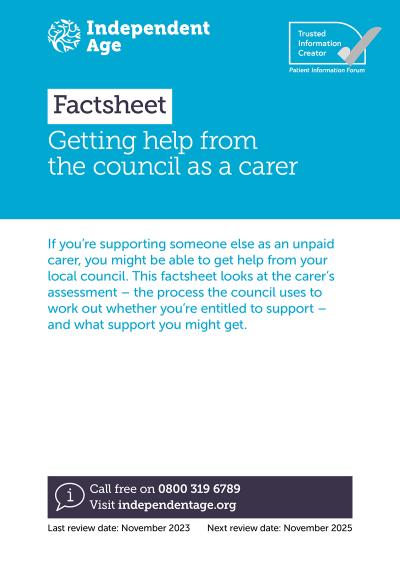Related publications

Caring for someone

If you’re a carer, you might be wondering what support is available to help you – particularly if your responsibilities are affecting your health or wellbeing. If caring for someone else isn’t part of your job, you’re entitled to a carer’s assessment from the local council.
A carer’s assessment, also called an Adult Carer Support Plan in Scotland, works out whether you qualify for support from the council in your role as an unpaid carer. It's a chance for you to talk about how your caring responsibilities affect you. It will look at:
Anyone who is a carer can get a carer’s assessment for free. Your assessment could be carried out over the phone, at home or somewhere other than your home if you prefer. In Scotland, this assessment is usually face to face. For more information, read our factsheet Getting help from the council as a carer.
Getting a carer’s assessment is the first step to getting help as a carer. It's a good opportunity to discuss your needs as a carer and to see what practical and financial support you can get from your local council or carer centre.
It can help to make life easier for both you and the person you’re caring for.
Carer’s assessments are carried out by your local council. If the person you care for lives in a different council area, their council will be responsible for your carer’s assessment.
You’ll need to contact the adult social care team at the council to arrange an assessment. Search for their contact details on Gov.uk or mygov.scot, or find them in the phone book.
The council should give you information explaining what will happen at the assessment. You’ll need to prepare so you can talk about your caring role and how it affects you. Here are a few questions to consider:
It’s worth keeping a diary of everything you do for one or two weeks before the assessment, so you don’t forget to mention anything. You can also ask the assessor to take a copy of it.
If you'd like to talk to someone about your carer's assessment and how to prepare, contact Carers UK.
If you need help to communicate or to make sense of the information you're given, for example, you may be entitled to an independent advocate during the carer’s assessment.
If you qualify for support, the council will contact you to discuss how they’re going to meet your needs. Examples of the kind of support you could be offered include:
The council must develop a written support plan with you that sets out how your needs will be met. They must also involve the person you care for if you wish, and anyone else you’d like to be involved.
In England and Wales, the council cannot charge you for any care and support for the person you look after (if there is a charge) – however, they may charge you for a service they provide directly to you. In Scotland, the council must not charge for any support for the carer.
Councils are advised not to charge carers for support provided directly to them, but some will charge. If they do charge, you’ll be given a financial assessment to work out if you'll pay towards any support you’re offered. You must only be charged for support provided directly to you. You cannot be charged for care and support given to the person you care for.
If you don’t qualify for support, this doesn’t mean you’re not a carer. The council must give you information and advice to help you in your caring role – for example, information about local carer support groups.
If you think the decision is wrong, you may want to make a complaint. See our page Complaints about care and health services for more information.

To find out more about the carer’s assessment, read our factsheet Getting help from the council as a carer.
For information about other support available to carers, read our guide Caring for someone.